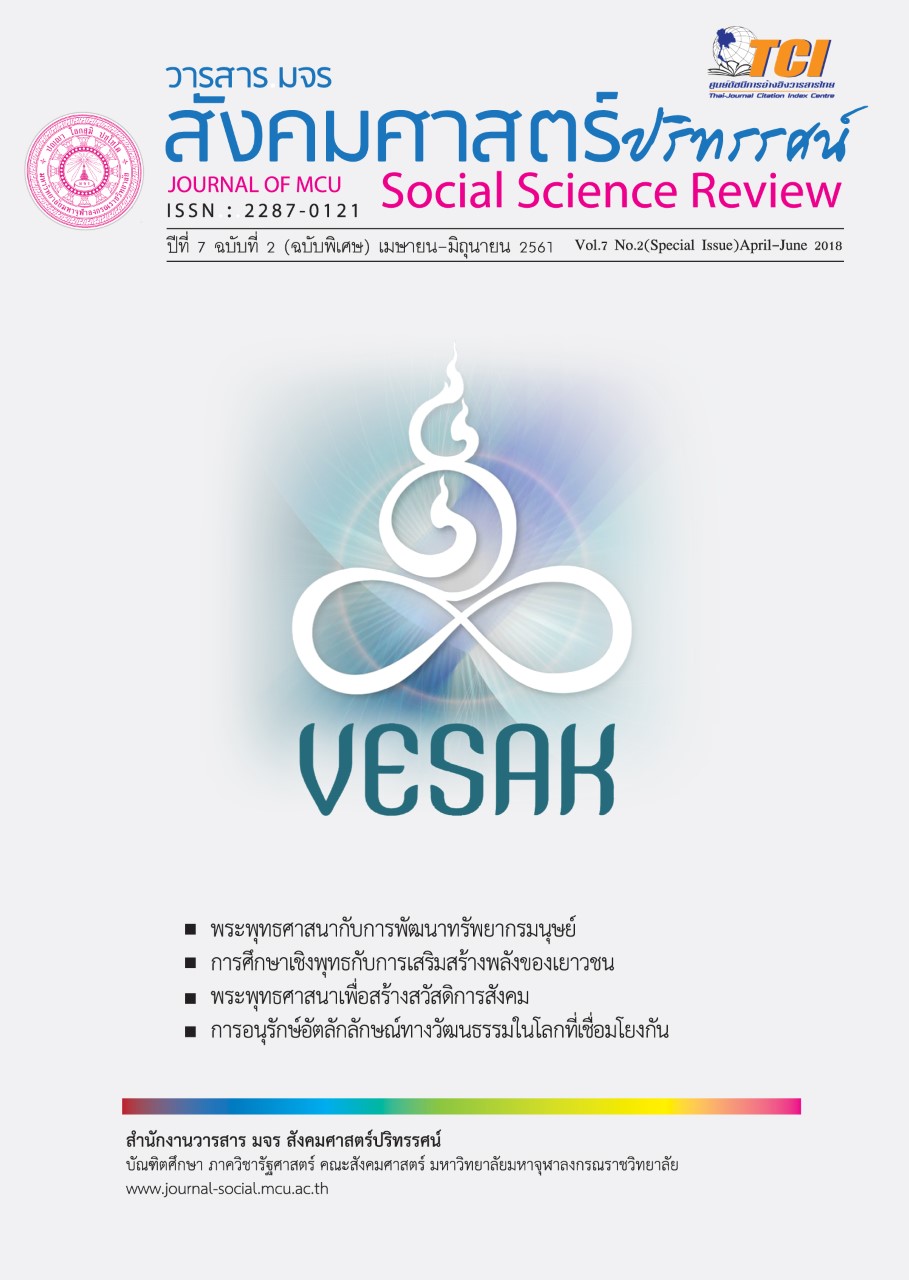SELECTIVE EXPOSURE, USES AND NEEDS OF INFORMATION ON BUDDHISM FOR THAI BUDDHIST
คำสำคัญ:
Selective Exposure, Uses and Needs of Information, Thai Buddhistบทคัดย่อ
The research aims to investigate the interests and practices of Buddhist principles among Buddhists, in relation to their selective exposure, uses, and needs of Buddhism information, as well as their opinions about the formats of Buddhist publicity. The study is characterized by both quantitative and qualitative research, wherein 400 questionnaires were distributed to Thai Buddhists and 100 Thai Buddhists were being interviewed with guided questions. In testing the hypotheses, the data were tabulated by computer, with descriptive analysis and inferential statistics. The quantitative findings concluded the followings points:
Thai Buddhists having differences in age, educational level, occupation, income level, geographic origin will have significant different interests and practices of Buddhist principles, Thai Buddhists having differences in age, occupation, income level, geographic origin will have significant differences in the frequency of their selective exposure to Buddhism information on Buddhist principles. Thai Buddhists having differences in age, educational level, income level, and geographical origin, interest and practices according to the Buddhist principles will have significant differences in their selective exposure to Buddhism-related-contents, uses, needs about Buddhism information as well as their opinions about the format of Buddhist publicity. There is a significant relationship among the Thai Buddhists’ interest and practice, Buddhist practices, frequency and content in their selective exposure, uses, and needs of Buddhism information and their opinions about the format of Buddhist publicity. The qualitative findings concluded the following points: The majority of Thai Buddhists show an interest and practice of Buddhist principles at the medium level. Television was ranked the top media that Thai Buddhists were exposed to the most. Buddhism-related-contents that Thai Buddhists like to be exposed to the most were Buddhist principles and practices. Thai Buddhists used Buddhism information as a framework in their daily life, and as a role model for imitation. Thai Buddhists perceive that Buddhism publicity is still insufficient, uninteresting, and boring. Buddhism publicity should be more modern, easy to understand, colorful, exciting, entertaining, and tailored toward a specific target audience.
ดาวน์โหลด
เผยแพร่แล้ว
รูปแบบการอ้างอิง
ฉบับ
ประเภทบทความ
สัญญาอนุญาต
ลิขสิทธิ์ (c) 2020 วารสาร มจร สังคมศาสตร์ปริทรรศน์

อนุญาตภายใต้เงื่อนไข Creative Commons Attribution-NonCommercial-NoDerivatives 4.0 International License.
เพื่อให้เป็นไปตามกฎหมายลิขสิทธิ์ ผู้นิพนธ์ทุกท่านต้องลงลายมือชื่อในแบบฟอร์มใบมอบลิขสิทธิ์บทความให้แก่วารสารฯ พร้อมกับบทความต้นฉบับที่ได้แก้ไขครั้งสุดท้าย นอกจากนี้ ผู้นิพนธ์ทุกท่านต้องยืนยันว่าบทความต้นฉบับที่ส่งมาตีพิมพ์นั้น ได้ส่งมาตีพิมพ์เฉพาะในวารสาร มจร สังคมศาสตร์ปริทรรศน์ เพียงแห่งเดียวเท่านั้น หากมีการใช้ภาพหรือตารางหรือเนื้อหาอื่นๆ ของผู้นิพนธ์อื่นที่ปรากฏในสิ่งตีพิมพ์อื่นมาแล้ว ผู้นิพนธ์ต้องขออนุญาตเจ้าของลิขสิทธิ์ก่อน พร้อมทั้งแสดงหนังสือที่ได้รับการยินยอมต่อบรรณาธิการ ก่อนที่บทความจะได้รับการตีพิมพ์ หากไม่เป็นไปตามข้อกำหนดเบื้องต้น ทางวารสารจะถอดบทความของท่านออกโดยไม่มีข้อยกเว้นใดๆ ทั้งสิ้น





